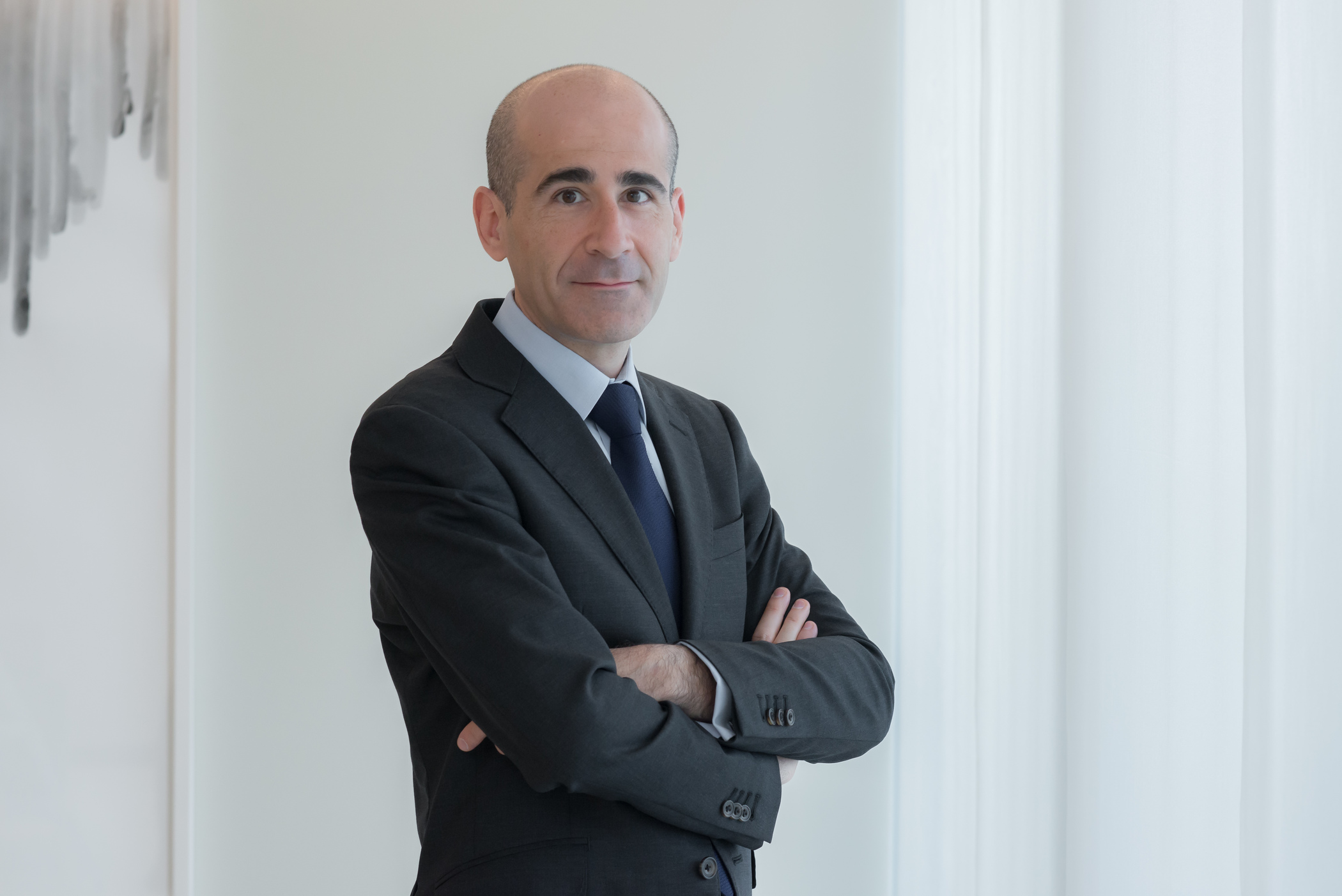Credit expert Stéphane Rüegg at Pictet Asset Management discusses what’s on the mind of his clients, the nascent green bond market and his very personal view of responsible investing.
Why does investing sustainably matter to you?
My awareness came about in different ways. First of all, watching the Rio Summit as a teenager, I vividly remember Brazilian indigenous leader Chief Raoni talking about the preservation of the Amazon forest. Also, I am a history buff and it occurred to me that lots of battles in military history would have had very different outcomes with climate change. The French were victorious at Austerlitz because the lake was frozen and they fired cannonballs that broke the ice; that lake has now dried up. A harsh winter during the battle of Teruel in the Spanish Civil War saw temperatures drop to minus 20 – nowadays they climb to 10 degrees in January. One contributing factor to the French Revolution was the poor harvest of 1788 which caused food shortages and high prices. These examples abound. Finally, I have lived in Asia and there are very few places where you can drink tap water, except perhaps Japan and Singapore. People drink from plastic bottles, which are not recycled. These different thoughts have made me reflect about the environment.
Even within Europe, there are some clear cultural distinctions around ESG
What are clients asking about?
Up until a few years ago, governance was the main ESG factor that influenced investments, and the environment mattered less because of the misalignment that former Bank of England governor Mark Carney calls ‘the tragedy of the horizon’: investment managers are judged on their 3-year track record while the impact of climate change will only be apparent in the coming decades.
However, with extreme weather events there has been a welcome realization that we are in a climate emergency. It has become a higher priority in Europe; Asian investors are looking at these developments and asking a lot of questions. Overall, clients’ main concern is ultimately driven by regulation. In Europe, we are moving towards a shared green taxonomy, but we will have to see how investors use it in the long run. It should not just be about hitting a threshold; we also need data that allows to track the progress of a company over the long term.
New standards will be gradually rolled out in Europe but even within the region, there are some clear cultural distinctions around ESG. German clients do not like nuclear power while others, like the French, think it’s necessary to make the transition to clean energy. In Belgium, home to many large brewers, the green label does not exclude alcohol.
Often, awareness about climate is the result of an environmental disaster, like Fukushima in Japan. In the US, the BP oil spill in the Gulf of Mexico helped change attitudes among American investors. The increased frequency of hurricanes and a spell of intense cold in Texas at the beginning of the year have intensified concerns about the environment across the US.
What risks investors in green fixed income should be aware of?
If I told you, imagine a bond with a social objective that allows people with little money to enter the property market and to integrate into society better, would you invest? Well, imagine it’s 2008 and I have just repackaged subprimes to you as a way to help American society reduce its fractures. So you have to be careful not to be dazzled by the green.
It’s a nascent market that requires you to have some major principles to guide your investments, like the moral compass that guides your personal life. You need to analyse the instrument as much as the issuer and follow up closely to ensure the company delivers on its promise. We are spoiled at Pictet because as a rule, we have what we think is the best supplier for each aspect of E, S and G – at the end of the day you need the data to understand ESG.
A broad-brush approach to evaluating companies’ ESG performance does not work, it is crucial to understand the dynamics of each sector. The environment is key for mining companies, for example, but the social aspect is equally important, in terms of accidents and working with local communities. A case in point is mining company Vale in Brazil where a lethal dam disaster caused the company to lose its position as the world’s largest iron ore extractor and sparked a governance and safety review. The way a company sets prices, or it treats customers or suppliers is just as important as the environment.
Are green ETFs an easy option for fixed income investors?
Green bonds ETF allow investors to dip a toe in the water, but they simply replicate an index. Bond index managers only include issuers that meet their eligibility criteria, so depending on data availability bonds may not be eligible for inclusion for a few months after issuance. When a company doesn’t report properly, it can take months to exclude the bond from the index.
And then it comes down to whether you agree with the benchmark. Do you include green bonds from companies that pollute? Do you include a green bond from an airport operator? When you buy an ETF you leave these decisions to the index provider. We think these are very important conversations to have with our clients.
It would be wrong to think that green bonds are the only way to gain exposure to virtuous companies. Companies in the business of blood testing or those in the health sector do not necessarily issue green bonds yet their contributions to society are important. Some companies may be ‘green’ but do not issue green bonds, such as this US water technology company we have in the portfolio. We bought the bonds because we were interested in the strategy of the company. Then they issued a green bond. On the other hand, we’ve had the example of an energy company promoting its sustainability credentials, then buying a shale gas company when the US energy market collapsed.
Does ESG change the job of professional investors?
In our team we have always cultivated a long-term mindset. Technological change and regulation are key inputs in our process because they can create new risks and opportunities and trigger a mini credit cycle in a sector. So, when ESG regulation started to come into force, we were not taken by surprise.
We also always have had a very fundamental investment approach of asking ourselves “why is the company making this acquisition/changing its business model by launching new products – does it make sense?” We may be opportunistic from time to time, but our approach is that we lend money to a company; we’re not traders.
We also talk to companies about our concerns. You can challenge company management during the meetings that you have with them, you don’t necessarily need defined engagements. Ultimately, governance is very important. You can’t trust a company on its environmental commitments if it doesn’t have good governance.
It would be wrong to think that green bonds are the only way to gain exposure to virtuous companies
Is the new generation more ESG-conscious?
I am not of the opinion that millenials believe in ESG much more than others. I think that each generation has its own biases and its blind spots. In the time of my grandparents, the harmfulness of tobacco was not taken into account at all. Today’s young people don’t understand the link between their streaming habits and the exponential growth of carbon emissions. Our ancestors saved water, used up all leftovers. Today we are in a much more wasteful society. My children don’t recycle. They have a sincerity about them, but they have blind spots, like all generations!
To read more about investing sustainably at Pictet Asset Management, click here to access the Responsible investment report.
Information, opinions and estimates contained in this document reflect a judgment at the original date of publication and are subject to risks and uncertainties that could cause actual results to differ materially from those presented herein.
Important notes
This material is for distribution to professional investors only. However it is not intended for distribution to any person or entity who is a citizen or resident of any locality, state, country or other jurisdiction where such distribution, publication, or use would be contrary to law or regulation.
The information and data presented in this document are not to be considered as an offer or sollicitation to buy, sell or subscribe to any securities or financial instruments or services.
Information used in the preparation of this document is based upon sources believed to be reliable, but no representation or warranty is given as to the accuracy or completeness of those sources. Any opinion, estimate or forecast may be changed at any time without prior warning. Investors should read the prospectus or offering memorandum before investing in any Pictet managed funds. Tax treatment depends on the individual circumstances of each investor and may be subject to change in the future. Past performance is not a guide to future performance. The value of investments and the income from them can fall as well as rise and is not guaranteed. You may not get back the amount originally invested.
This document has been issued in Switzerland by Pictet Asset Management SA and in the rest of the world by Pictet Asset Management (Europe) SA, and may not be reproduced or distributed, either in part or in full, without their prior authorisation.
For US investors, Shares sold in the United States or to US Persons will only be sold in private placements to accredited investors pursuant to exemptions from SEC registration under the Section 4(2) and Regulation D private placement exemptions under the 1933 Act and qualified clients as defined under the 1940 Act. The Shares of the Pictet funds have not been registered under the 1933 Act and may not, except in transactions which do not violate United States securities laws, be directly or indirectly offered or sold in the United States or to any US Person. The Management Fund Companies of the Pictet Group will not be registered under the 1940 Act.
Pictet Asset Management (USA) Corp (“Pictet AM USA Corp”) is responsible for effecting solicitation in the United States to promote the portfolio management services of Pictet Asset Management Limited (“Pictet AM Ltd”), Pictet Asset Management (Singapore) Pte Ltd (“PAM S”) and Pictet Asset Management SA (“Pictet AM SA”). Pictet AM (USA) Corp is registered as an SEC Investment Adviser and its activities are conducted in full compliance with SEC rules applicable to the marketing of affiliate entities as prescribed in the Adviser Act of 1940 ref.17CFR275.206(4)-3.
Pictet Asset Management Inc. (Pictet AM Inc) is responsible for effecting solicitation in Canada to promote the portfolio management services of Pictet Asset Management Limited (Pictet AM Ltd) and Pictet Asset Management SA (Pictet AM SA).
In Canada Pictet AM Inc is registered as Portfolio Manager authorized to conduct marketing activities on behalf of Pictet AM Ltd and Pictet AM SA

